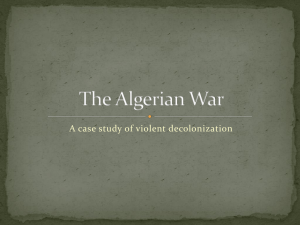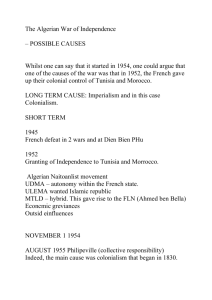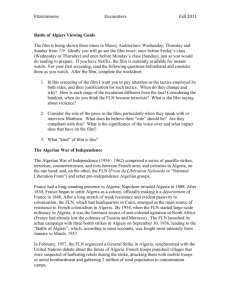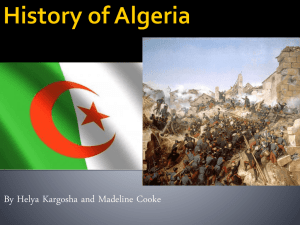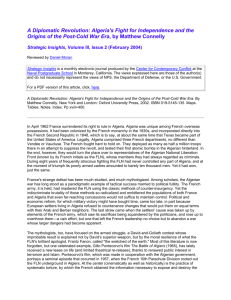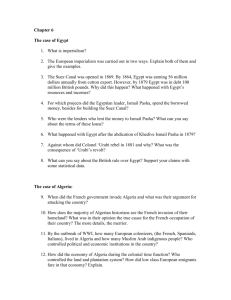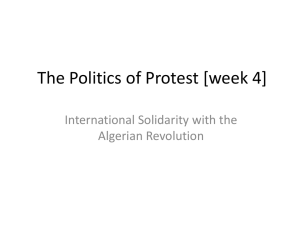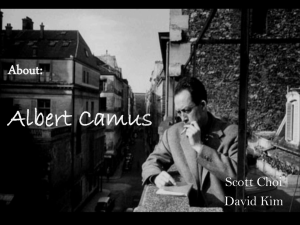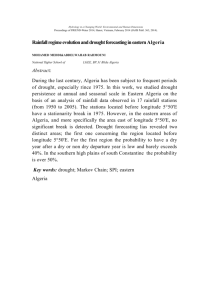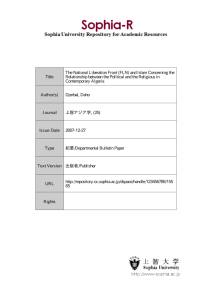File
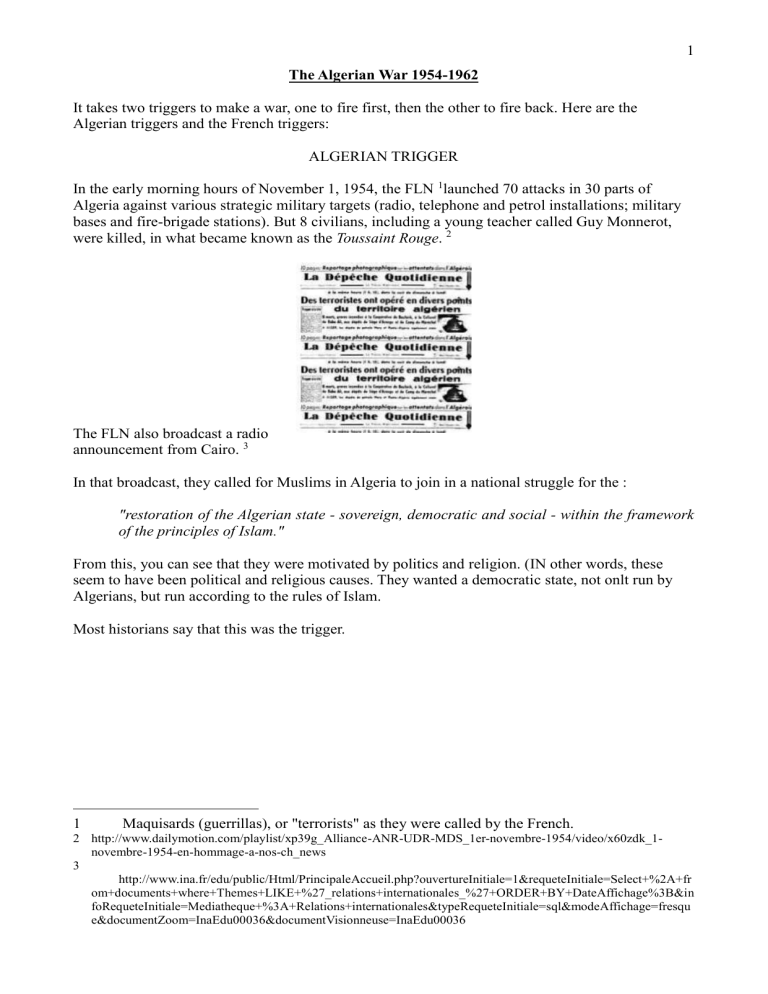
1
The Algerian War 1954-1962
It takes two triggers to make a war, one to fire first, then the other to fire back. Here are the
Algerian triggers and the French triggers:
ALGERIAN TRIGGER
In the early morning hours of November 1, 1954, the FLN
1 launched 70 attacks in 30 parts of
Algeria against various strategic military targets (radio, telephone and petrol installations; military bases and fire-brigade stations). But 8 civilians, including a young teacher called Guy Monnerot, were killed, in what became known as the Toussaint Rouge .
2
The FLN also broadcast a radio announcement from Cairo.
3
In that broadcast, they called for Muslims in Algeria to join in a national struggle for the :
"restoration of the Algerian state - sovereign, democratic and social - within the framework of the principles of Islam."
From this, you can see that they were motivated by politics and religion. (IN other words, these seem to have been political and religious causes. They wanted a democratic state, not onlt run by
Algerians, but run according to the rules of Islam.
Most historians say that this was the trigger.
1 Maquisards (guerrillas), or "terrorists" as they were called by the French.
2 http://www.dailymotion.com/playlist/xp39g_Alliance-ANR-UDR-MDS_1er-novembre-1954/video/x60zdk_1novembre-1954-en-hommage-a-nos-ch_news
3 http://www.ina.fr/edu/public/Html/PrincipaleAccueil.php?ouvertureInitiale=1&requeteInitiale=Select+%2A+fr om+documents+where+Themes+LIKE+%27_relations+internationales_%27+ORDER+BY+DateAffichage%3B&in foRequeteInitiale=Mediatheque+%3A+Relations+internationales&typeRequeteInitiale=sql&modeAffichage=fresqu e&documentZoom=InaEdu00036&documentVisionneuse=InaEdu00036
FRENCH TRIGGER:
The response of the French Socialist Prime Minister, Pierre Mendès-France and his Minister of the
Interior, Francois Mitterand, was:
"One does not compromise when it comes to defending the internal peace of the nation, the unity and integrity of the Republic. The Algerian departments are part of the French
Republic. They have been French for a long time, and they are irrevocably French [...]
Between them and metropolitan France there can be no conceivable secession."
Pierre Mendès France said the French must « défendre la paix intérieure » and « l'intégrité de la
République
».
François Mitterrand, Ministre de l'Intérieur, said: « L'Algérie, c'est la France. Des Flandres au
Congo, il y a la loi, une seule nation, un seul Parlement
. »
Here is one of the propaganda posters put out by the French government at the time:
( Fellaghas means 'pro-
Independence fighters' of whom there were about 500 in 1954 .)
So, why did the French government react in this way? After all, many French people were opposed to French colonialism, and many of them had supported Mendès-France's efforts to withdraw from
2
3
Tunisia and Morrocco.
4
Moreover, international opinion was in favour of the process of decolonisation.
PIEDS-NOIRS
The problem in Algeria was a social one: there were 1 million French settlers in Algeria, amidst 8 million Arabs and Berbers. Given the increasing tensions between them and the native Algerians, which had now broken out into violent conflict, their future and safety was not obvious and assured.
If this was an immediate social cause for military intervention as far as the French were concerned
(and to the extent that the Pied-Noirs were on the whole doing quite well, one could also say resentment of their social advantages was also a cause for bringing the native Algerians to war,) there were other, longer term causes that led to both sides in this Franco-Algerian war pulling their respective triggers.
CAUSES
EARLIER ATTACKS (PRIOR TO 1954) THAT INCREASED THE TENSION EVEN BEFORE
OFFICIAL ARMED CONFLICT
(A) SETIF MASSACRE
May 8, 1945, the very same day the Nazi's surrendered in Europe, the Sétif massacre occurred.
Muslim Paraders were attacked. French police fired on the marchers who were shouting ' vive l'independence ').
Saal Bouzid, a young boy carrying the Algerian flag, was among the first to fall, making him an instant martyr. Some Europeans were killed.
In return, the French Army and Pied Noir (Algerians of European descent ie French settlers) mobs killed about 6,000 Algerians.
Some Algerians say more than 45,000 dead, while initial French estimates claimed only 1,500 casualties. (TOK)
The demonstration was in part encouraged by the French Communist Party.
The demonstration was lead by Messali Hadj and Ferhat Abbas.
Prior to that, Hadj had not been after independence.
A FEW DETAILS ON THOSE ALGERIANS INVOLVED IN THE RISE OF ALGERIAN
NATIONALISM
In 1937 Messali Hadj had set up the PPA (Algerian People's Party). But in 1937 they only wanted autonomy, not independence .
Messali Hadj's PPA gained support through the Union of Algerian Workers in France.
So in 1937 their demands were not as radical as they later became after the Sétif massacre under the
FLN, who wanted out and out independence. (which suggests that the Setif massacre was the cause of a radicalisation of the Algerian nationalist movement)
4 In 1956 Tunnisia and Morrocco were granted their independence by the loi-cadre Deferre.
Many of the FLN trace back their ‘nationalism’ and their desire for complete independence to this massacre
IF THES WERE THE
TRIGGERS,
WHAT WERE THE
CAUSES?
LONG TERM CAUSE
French colonialism
This is Government Square in
Algiers, with the Mosque of Djemaa Djedid.
In front of the mosque the French placed a statue of the Duc d'Orléans.
At this point, one has to speak about the imperial legacy of the 19 th
century.
In 1830 the French colonised Algeria.
By 1840 this soldier, Marshal Thomas Bugeaud (1784-1849), duc d'Isly, Maréchal de France, was running Algeria.
4
To give you an idea of how superior the French felt to the Algerians, Alex de Toqueville, Europe's most respected political philosopher and theorist of democracy wrote of the French wars in Africa:
" War in Africa is a science. Everyone is familiar with its rules and everyone can apply those rules with almost complete certainty of success. One of the greatest services that Field Marshal Bugeaud has rendered his country is to have spread, perfected and made everyone aware of this new science ."
LONG TERM SOCIAL CAUSE:ANTI-COLONIAL UNREST
Resistance to French presence began immediately and continued throughout the rest of the nineteenth century.
A lot of this social tension was caused by the fact that the Muslim population was never fully integrated into the French system in Algeria.
They were never made French citizens. This discrimination was codified in 1881 with the Code de l'indigénat.
It was this that led to increasing Algerian alienation from the French colonial rule, and lead to another long term cause: the rise of Algerian Nationalism
LONG TERM IDEOLOGICAL CAUSE: THE RISE OF NATIONALISM AND POST-
COLONIALISM
POST WORLD-WAR 1: WILSON'S 14 POINTS
After World War 1, anti-colonialism and nationalism was spreading as an idea around the world.
This basis of nationalism and anti-colonialism was encouraged further by intellectuals (ouléma) who advocated Wilson's 1918
Fourteen Points.
Ferhat Abbas
5
6
In 1946, Ferhat Abbas, who wanted independence, founded the Democratic Union of the Algerian
Manifesto (UDMA) and was elected as a deputy.
In 1954, the National Liberation Front (FLN) succeeded Messali Hadj's Algerian People's Party
(PPA), Its leaders created an armed wing, the Armée de Libération Nationale (National Liberation
Army) to engage in armed struggle against French authority.
This, under the FLN the independence movement became more radicalised.
SHORT TERM CAUSE
The radicalisation of Algerian Nationalism, both in terms of the use of violence and the role of religion in establishing an independent Muslim Algeria.
10 th
October 1954, the FLN was set up. These were more prepared to use violence than the earlier
Algerian Nationalist groups represented by Ferhat Abbas's UDMA and the Communists of the PCA
Frantz Fanon (below), a psychiatrist from Martinique, became the FLN's leading political theorist.
He provided a sophisticated intellectual justification for the use of violence in achieving national liberation.
Ben Bella (below)ordered the killing of anyone prepared to compromise with the French.
To see evidence that Algerian nationalism and anti-colonialism was a cause, look at this poster which was put up on a wall in June 29 1962.
Similarly, in the 1954 broadcast one can hear four ideological causes: nationalism, democracy, socialism and religion. They said they wanted the "restoration of the Algerian state - sovereign, democratic and social - within the framework of the principles of Islam."
The call for social reform in the midst of the Cold War would have worried the French authorities that the Soviets were behind it.
7
8
ANOTHER SHORT TERM CAUSE:
World War II was also a short term cause of the Algerian War of Independence.
France had been severely weakened by World War II. 1943: With the French capitulation in the
Second World War, the nationalists form the party Istiqlal, which called for total independence for
Morocco.
SHORT TERM POLITICAL CAUSE (internal to France)
Was it also caused by instability in French politics, which itself was a consequence of World War II.
Hence the eventual demise of the 4 th
Republic in 1958.
PRIMARY SOURCES
TWO NEWSPAPERS, TWO DIFFERENT VIEWS
9
10
COURSE AND PRACTICES OF THE WAR
Eduard Faure, and by 1956, Guy Mollet, decided to send even more soldiers in to Algeria, 'to pacify'.
5
(Guy Mollet)
FLN and MMA both wanted to win over and control those Algerians in France. So they fought 'café wars' in France (on the French mainland) with each other.
FLN had many tactics to win support – including coercion.
Pied-noirs started to leave as the war spread into the countryside.
In return, pied noir vigilantes carried out 'ratonnades' – raton is racist for North Africans.
1955
By 1955 Jacques Soustelle (pro de Gaulle) had come up with the Soustelle Plan to improve the economic conditions of the Muslims.
August 1955 : the Philippeville massacre – of Pied Noir civilians by the FLN. It killed 123. FLN said 12,000 Algerians were killed in response.
5 It is what the Russians recently said about their intervention in Georgia.
11
Soustelle said sterner measurements were required.
His successor was General Lacoste,
Lacoste closed the Algerian Assembly and ruled by decree, giving the army exceptional police powers whilst at the same time offered a proposal giving Algeria more autonomy.
In late 1955, Mohammed V successfully negotiated the gradual restoration of Moroccan independence within a framework of French-Moroccan interdependence. The sultan agreed to institute reforms that would transform Morocco into a constitutional monarchy with a democratic form of government.
By November 1955, France granted Morocco independence; which helped pave the way for
Tunisia’s independence. March 20, 1956, Tunisia achieved independence from France proposed by
Habib Bourguiba.
1956
In February 1956, Morocco acquired limited home rule. Further negotiations for full independence culminated in the Spanish-Moroccan Agreement signed in Paris on March 2, 1956.[4] On April 7 of that year France officially relinquished its protectorate in Morocco.
August 1956 FLN set up the CNRA (Conseil National de la Revolution Algerienne).
FLN wanted worldwide recognition for their cause.
They called for a General Strike.
30 September 1956 the
Battle of Algiers began when three women placed bombs, one in the downtown office of Air France.
General Jacques Massu was ordered to do anything to stop it.
12
Even villages were bombarded.
By 1956 there were 400,000 French troops in Algeria.
October 1956, Ben Bella's Moroccan plane forced down by the French in Alggiers. He was arrested.
FLN took an even harder line as a consequence.
Nasser supported the FLN.
13
1957
In 1957 the General Strike began – timed to coincide with the UN debate on Algeria.
By 1957 FLN was better armed and had 40,000
The FLN used hit and run military tactics (merge with the population) also attacked Muslims.
Gradually, however, the FLN gained control in certain sectors of the Aurès, the Kabylie, and other mountainous areas around Constantine and south of Algiers and Oran.
Late in 1957, General Raoul Salan, who was the commander of the French army in Algeria, instituted a system of quadrillage
(surveillance using a grid pattern), dividing the country into sectors, each permanently garrisoned by troops responsible for suppressing rebel operations in their assigned territory. Salan's methods sharply reduced the instances of FLN terrorism but tied down a large number of troops in static defense. Salan also constructed a heavily patrolled system of barriers to limit infiltration from Tunisia and Morocco. The best known of these was the Morice Line (named for the French defense minister, André Morice), which consisted of an electrified fence, barbed wire, and mines over a 320-kilometer stretch of the Tunisian border.
In the three years (1957–60) he carried out what was known as ‘the regroupement program’. It meant that more than 2 million Algerians were removed from their villages, mostly in the mountainous areas, and resettled in the plains.
14
1958
1958 new French military tactic was introduced. They decided to use mobile forces. These were deployed on massive search-and-destroy missions against FLN strongholds.
The next French General was Maurice Challe,
He came on even more heavy handedly and appeared to have suppressed major rebel resistance.
The problem was, by then, political developments had already overtaken the French army's successes.
There was a great instability of party politics.
The army itself was already worried that Algeria would be a mess like Indochina in 1954.
Thid all culminated in the May crisis.
THE MAY CRISIS (This is one of the important political consequences of the war with regard to
France)
May 13 Soustelle and Massu organised a putsch demanding de Gaulle be made ruler by President
Rene Coty, to stop France losing Algeria. They took Corsica and planned to take Paris if de Gaulle was not granted powers. De Gaulle was granted the powers.
15
1958 July 4 th
de Gaulle goes to Algeria. He was trying to win over Algerian moderates, and get them to accept French rule
In reaction, the FLN set up the Provisional Government of the Algerian Republic (GPRA), a government-in-exile headed by Abbas and based in Tunis.
It was recognized by Morocco, Tunisia, and several other Arab countries, by a number of Asian and
African states, and by the Soviet Union and other Eastern European states. So it was getting absorbed in Cold War politics.
1959
In February 1959, de Gaulle was elected president of the new Fifth Republic.
16
In 1958–59 the French army had won military control in Algeria and was the closest it would be to victory.
But in September 1959 General de Gualle made a remarkable statement which dramatically reversed his position on this issue. In it he uttered the words "self-determination," which he envisioned as leading to majority rule in an Algeria formally associated with France.
1960
Those Europeans who felt de Gaulle wa betraying them staged an insurrection in the Algerian capital starting on January 24, 1960 and known in France as La semaine des barricades
17
1961
De Gaulle then convoked a referendum on the independence of Algeria on January 8, 1961.
It gave 75% of "yes" in metropolitan France, but only 40% in Algeria.
In April 1961, the Generals of the army tried to take over in order to stop the French government negotiating peace with the FLN.
18
De Gaulle was now prepared to abandon the pieds-noirs, the group that no previous French government was willing to write off.
EVIAN PEACE TALKS
Talks with the FLN reopened at Evian in May 1961.
The French government decreed that a ceasefire would take effect on March 19, 1962
19
1962.
March 19 1962 cease-fire begins.
Evian Accords
In their final form, the Evian Accords allowed the pieds-noirs equal legal protection with Algerians over a three year period. These rights included respect for property, participation in public affairs, and a full range of civil and cultural rights. At the end of that period, however, all Algerian residents would be obliged to become Algerian citizens or be classified as aliens with the attendant loss of rights.
Referendum
The French electorate approved the Evian Accords by an overwhelming 91 percent vote in a referendum held in June 1962.
OAS campaign
Between March and June (between the cease-fire and the referendum) the OAS unleashed a new terrorist campaign to provoke a major breach in the ceasefire by the FLN but the terrorism now was aimed also against the French army and police enforcing the accords as well as against Muslims. It was the most wanton carnage that Algeria had witnessed in eight years of savage warfare. OAS operatives set off an average of 120 bombs per day in March, with targets including hospitals and schools.
Ultimately, the terrorism failed in its objectives, and the OAS and the FLN concluded a truce on
June 17, 1962.
In the same month, June 1962, more than 350,000 Pied-noirs left Algeria.
Algerian vote for Independence
On July 1, 1962, some 6 million of a total Algerian electorate of 6.5 million cast their ballots in the referendum on independence. The vote was nearly unanimous.
De Gaulle pronounced Algeria an independent country on July 3. The Provisional Executive, however, proclaimed July 5, the 132nd anniversary of the French entry into Algeria, as the day of national independence.
Oran massacre
The Oran massacre of 1962, four days after the vote, is the main example of deliberate strategy of killing to terrorize pieds-noirs and push them to leave. These tactics proved effective. Summer 1962 saw a rush to France.
1963
Within a year, 1.4 million refugees, including almost the entire Jewish community and some pro-
French Muslims, had joined the exodus to France.
20
In metropolitan France, in 1963, 43% of French Algerians lived in bidonvilles (shanty towns)
CONSEQUENCES OF THE ALGERIAN WAR OF INDEPENDENCE
DEATHS
IMMEDIATE
Social/Demographic
One immediate demographic consequence was the resettling of the Pied-noirs.
In June 1962 350,000 left Algeria for France.
By July 1963 1.4 million refugees, including almost the entire Jewish community and some pro-
French Muslims, had joined the exodus to France.
This was the most massive relocation of population to Europe since the Second World War. A motto among the Pied-noirs community was "Suitcase or coffin" (" La valise ou le cercueil ").
The so-called harkis , from the Arabic word haraka (movement), were the Muslim Algerians (as opposed to Europeans-descended or Jews) who fought on the side of the French army. The term also came to include non-fighting Muslim Algerians who supported a French Algeria. According to
France, in 1962 there were 236,000 Algerian Muslims fighting for the French army; some estimates suggest that, with their families, they may have numbered at much as 1 million, but 400,000 is more commonly cited.
POLITICAL:
The French army may have won the war, but Algeria got its independence
Ahmed Ben Bella, who had been arrested in 1956 along with other FLN leaders, became the first
President of Algeria.
It raised the issue of torture.
This war served as a model of guerilla counter-insurgency tactics.
In France, as a consequence of THE MAY CRISIS, it led to the fall of the Fourth Republic.
A major political consequence of this war was the collapse of the Fourth Republic.
May 13 Soustelle and Massu organised a putsch demanding de Gaulle be made ruler by President
Rene Coty, to stop France losing Algeria. They took Corsica and planned to take Paris if de Gaulle was not granted powers. De Gaulle was granted the powers. He and his Gallist followers set up the
Fifth republic's.
LONG TERM EFFECTS
Very long term troubled relationship between France and Algeria.
21
The Paris massacre of 1961 was recognized by the French state only in October 2001.
The Oran massacre of 1962 by the FLN has not been recognized yet by the Algerian state.
After Algeria's independence was recognised, Ahmed Ben Bella quickly became more popular, and thereby more powerful. In June 1962, he challenged the leadership of Premier Benyoucef Ben
Khedda; this led to several disputes among his rivals in the FLN, which were quickly suppressed by
Ben Bella's rapidly growing support, most notably within the armed forces. By September, Bella was in control of Algeria by all but name, and was elected as Premier in a one-sided election on 20
September, and was recognised by the United States on September 29.
Algeria was admitted as the 109th member of the United Nations on 8 October 1962. Afterwards,
Ben Bella declared that Algeria would follow a neutral course in world politics; within a week he met with U.S. President John F. Kennedy requesting more aid for Algeria, with Fidel Castro, expressing approval of Castro's demands for the abandonment of Guantanamo Bay and returned to
Algeria requesting that France withdraw from its bases there. In November, Ben Bella's government banned the party, providing that the only party allowed to overtly function was the NLF. Shortly thereafter in 1965 Bella was deposed and placed under house arrest (and later exiled) by Houari
Boumédiènne, who served as president until his death in 1978. Algeria remained stable, though in a one-party state, until violent civil war broke out in the 1990s.
1976 - Boumedienne introduces a new constitution which confirms commitment to socialism and role of the National Liberation Front (FLN) as the sole political party. Islam is recognised as state religion.
1976 December - Boumedienne is elected president and is instrumental in launching a programme of rapid industrialisation.
In 1992 a general election won by an Islamist party was annulled, marking the beginning of a bloody campaign which saw the slaughter of more than 150,000 people.
